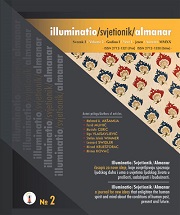BOŠNJACI I BOSNA: studija iz filozofije politike (2)
BOSNIAKS AND BOSNIA: A Study in the Philosophy of Politics (2)
Author(s): Ferid MuhićSubject(s): Philosophy of Science, Developing nations, Nationalism Studies, Inter-Ethnic Relations, Politics and Identity, Identity of Collectives
Published by: Centar za dijalog - Vesatijja
Keywords: Bosniak; Bosnian; Bosniakism; Bosnianhood; people; nation; Bosnia and Herzegovina; Serbs; Croats;
Summary/Abstract: In the first part of this study, published in the first issue of the magazine Illuminatio/Svjetionik/Almanar, the author briefly outlined the basic elements of the philosophy of politics characteristic of the history of modern nations in which he analysed the relations of the individual, the people, the nation and the state. The second part of this study focuses on the attitude of Bosniaks towards collective memory, which, according to the author, was brought to the threshold of amnesia under the influence of the long-term political strategy of their neighbours. The author believes that the shaken collective memory represents the most neuralgic problem and the greatest danger for the historical reintegration and homogenization of Bosniaks as an ethnicity and a nation. The author emphasizes that “Bosnian” is a territorial determinant and completely excludes the national determinant “Bosniak”. Flirting with the phrase “Bosniaks/Bosnians”, which is often used, is not only a denouncement of the ethnic and national affiliation of Bosniaks, but further denies their uniqueness – and thus calls into question the very existence of Bosniaks. A Bosniak is born, a Bosniak remains. A "Bosnian" becomes, a "Bosnian" cease to be. A Bosniak living in Bosnia is also a "Bosnian". A "Bosnian" who is not a Bosniak does not become a Bosniak anywhere, not even in Bosnia. A Bosniak who does not live in Bosnia remains a Bosniak, but ceases to be a "Bosnian". The goal of substituting the historical name Bosniaks with the territorial designation "Bosnians" is obvious: Break the homogeneous core of Bosniaks by erasing awareness of their ethnic identity, name, national unity, common history, culture, language, in short – a common past, present and future. The study also recalls the difference between the modern understanding of the nation and the way in which this social phenomenon was interpreted until the middle of the 20th century. Behind the separation of the nation from the ethnicity/people, as the supposedly superior form, lies the effort to relativize the ethnicity/people, as an objective fact, to weaken the mutual ties of its members and to bring the entire population under the control of central political power – as a seemingly integrated and homogeneous whole.
Journal: Illuminatio/Svjetionik/Almanar
- Issue Year: 1/2020
- Issue No: 2
- Page Range: 91-127
- Page Count: 37
- Language: Bosnian, English

